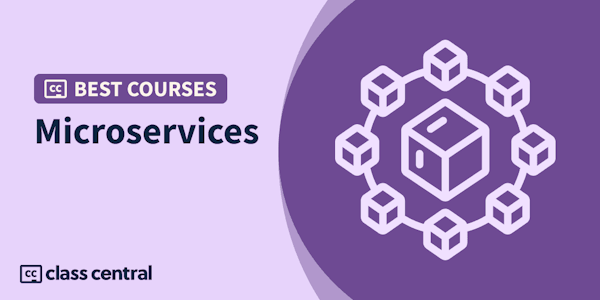Building Cloud Computing Solutions at Scale
Duke University via Coursera Specialization
-
15
-
- Write review
Overview
With more companies leveraging software that runs on the Cloud, there is a growing need to find and hire individuals with the skills needed to build solutions on a variety of Cloud platforms. Employers agree: Cloud talent is hard to find. This Specialization is designed to address the Cloud talent gap by providing training to anyone interested in developing the job-ready, pragmatic skills needed for careers that leverage Cloud-native technologies.
In the first course, you will learn how to build foundational Cloud computing infrastructure, including websites involving serverless technology and virtual machines, using the best practices of DevOps. The second course will teach you how to build effective Microservices using technologies like Flask and Kubernetes that are continuously deployed to a Cloud platform: Amazon Web Services (AWS), Azure or Google Cloud Platform (GCP). The third course begins to put together all of the Cloud concepts introduced in the first two courses to tackle more complex data engineering solutions. And finally, in the fourth course you will apply Machine Learning Engineering to build a Flask web application that serves out Machine Learning predictions.
Syllabus
Course 1: Cloud Computing Foundations
- Offered by Duke University. Welcome to the first course in the Building Cloud Computing Solutions at Scale Specialization! In this course, ... Enroll for free.
Course 2: Cloud Virtualization, Containers and APIs
- Offered by Duke University. Welcome to the second course in the Building Cloud Computing Solutions at Scale Specialization! In this course, ... Enroll for free.
Course 3: Cloud Data Engineering
- Offered by Duke University. Welcome to the third course in the Building Cloud Computing Solutions at Scale Specialization! In this course, ... Enroll for free.
Course 4: Cloud Machine Learning Engineering and MLOps
- Offered by Duke University. Welcome to the fourth course in the Building Cloud Computing Solutions at Scale Specialization! In this course, ... Enroll for free.
- Offered by Duke University. Welcome to the first course in the Building Cloud Computing Solutions at Scale Specialization! In this course, ... Enroll for free.
Course 2: Cloud Virtualization, Containers and APIs
- Offered by Duke University. Welcome to the second course in the Building Cloud Computing Solutions at Scale Specialization! In this course, ... Enroll for free.
Course 3: Cloud Data Engineering
- Offered by Duke University. Welcome to the third course in the Building Cloud Computing Solutions at Scale Specialization! In this course, ... Enroll for free.
Course 4: Cloud Machine Learning Engineering and MLOps
- Offered by Duke University. Welcome to the fourth course in the Building Cloud Computing Solutions at Scale Specialization! In this course, ... Enroll for free.
Courses
-
Welcome to the first course in the Building Cloud Computing Solutions at Scale Specialization! In this course, you will learn how to build foundational Cloud computing infrastructure, including websites involving serverless technology and virtual machines. You will also learn how to apply Agile software development techniques to projects which will be useful in building portfolio projects and global-scale Cloud infrastructures. This course is ideal for beginners as well as intermediate students interested in applying Cloud computing to data science, machine learning and data engineering. Students should have beginner level Linux and intermediate level Python skills. For your project in this course, you will build a statically hosted website using the Hugo framework, AWS Code Pipelines, AWS S3 and GitHub.
-
Welcome to the third course in the Building Cloud Computing Solutions at Scale Specialization! In this course, you will learn how to apply Data Engineering to real-world projects using the Cloud computing concepts introduced in the first two courses of this series. By the end of this course, you will be able to develop Data Engineering applications and use software development best practices to create data engineering applications. These will include continuous deployment, code quality tools, logging, instrumentation and monitoring. Finally, you will use Cloud-native technologies to tackle complex data engineering solutions. This course is ideal for beginners as well as intermediate students interested in applying Cloud computing to data science, machine learning and data engineering. Students should have beginner level Linux and intermediate level Python skills. For your project in this course, you will build a serverless data engineering pipeline in a Cloud platform: Amazon Web Services (AWS), Azure or Google Cloud Platform (GCP).
-
Welcome to the second course in the Building Cloud Computing Solutions at Scale Specialization! In this course, you will learn to design Cloud-native systems with the fundamental building blocks of Cloud computing. These building blocks include virtual machines and containers. You will also learn how to build effective Microservices using technologies like Flask and Kubernetes. Finally, you will analyze successful patterns in Operations including: Effective alerts, load testing and Kaizen. This course is ideal for beginners as well as intermediate students interested in applying Cloud computing to data science, machine learning and data engineering. Students should have beginner level Linux and intermediate level Python skills. For your project in this course, you build a containerized Flask application that is continuously deployed to a Cloud platform: Amazon Web Services (AWS), Azure or Google Cloud Platform (GCP).
Taught by
Noah Gift
Tags
Reviews
3.0 rating, based on 1 Class Central review
Showing Class Central Sort
-
- Introductional information
- Many repetitions of information in courses
- High prices
- Video lectures were not specifically prepared for Coursera, but got from other courses or lectures in the university. The information isn't a high quality.







